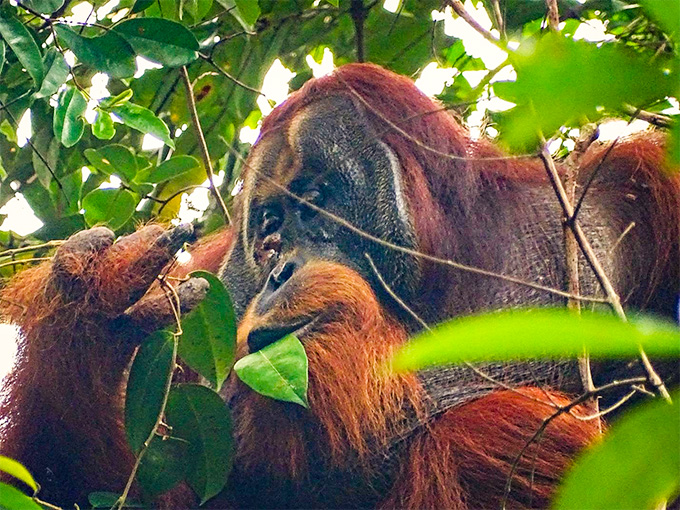For the first time, an orangutan has been seen doctoring a wound. Scientists describe it as the first evidence of a wild animal caring for a wound using a natural substance that’s known to aid healing.
Researchers shared their discovery May 2 in Scientific Reports.
The team had been studying great apes in Indonesia’s Gunung Leuser National Park. Some 150 orangs live in its Suaq Balimbing research area. Scientists have been studying these animals since 1994. In June 2022, Ulil Azhari was watching a male Sumatran orangutan (Pongo abelii) named Rakus.
The ape was chewing on a thick woody vine, or liana. The animal then rubbed the liana paste onto an open cheek wound that was several days old. He likely got it in a fight with another male. Rakus applied the paste several times over the span of about seven minutes. Then he smeared pulp from the plant’s leaves over his injury. He used those leaves almost like a bandage.
Local people, it turns out, use the same plant (Fibraurea tinctoria) in traditional medicine. It’s known to slow or limit the growth of bacteria and to fight inflammation.
Isabelle Laumer is a cognitive biologist on the research team. She works at the Max Planck Institute for Animal Behavior in Konstanz, Germany. After reading Azhari’s notes, she recalls “immediately getting very excited.” This ape, she points out, “only treated his wound and not any other body part. And this was done repeatedly.”

That wound closed within five days of being treated. And it never got infected. The orang’s focused effort convinced Laumer that Rakus’s use of the liana paste to treat his gash had been deliberate. It showed purpose.
“There’s a lot of [published reports] about animals applying things to areas that hurt,” says zoologist Michael Huffman. He works at Nagasaki University, in Japan, where he has studied primate self-medication for decades. “But this, I think, is the first published paper,” he says, “with details of both the chemical properties of the plant and the progress of the treatment.”
Laumer says she hopes her team’s finding will make people care more about protecting orangutans. One look at these apes and you understand how they got their name. “Orang” means person in the Malay language. “Hutan” means forest. The apes’ human likeness doesn’t stop with their bright eyes, mustache and beard. Yet all three species of orangutans are critically endangered. “It would be so sad,” she says, “if they would vanish from this world.”











/https://tf-cmsv2-smithsonianmag-media.s3.amazonaws.com/filer_public/34/31/3431771d-41e2-4f97-aed2-c5f1df5295da/gettyimages-1441066266_web.jpg)







Discussion about this post